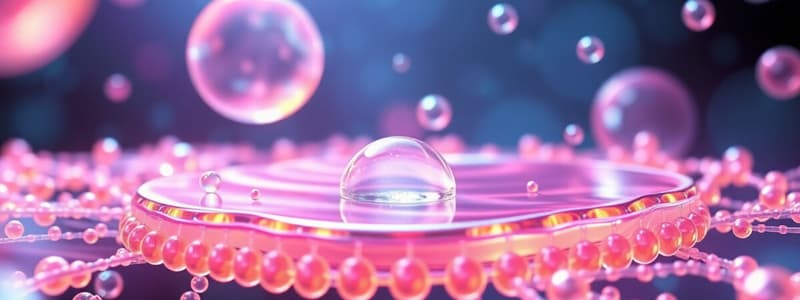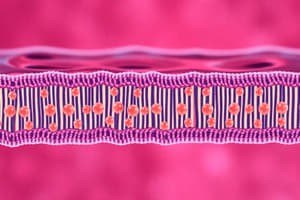Podcast
Questions and Answers
What type of proteins span the entire membrane?
What type of proteins span the entire membrane?
- Lipid-bound proteins
- Integral membrane proteins (correct)
- Peripheral proteins
- Surface proteins
How are transmembrane proteins generally attached to the membrane?
How are transmembrane proteins generally attached to the membrane?
- Permanent ionic bonds
- Weak noncovalent interactions (correct)
- Covalent bonds with lipids
- Directly fused with the membrane
Which of the following statements about peripheral proteins is true?
Which of the following statements about peripheral proteins is true?
- They are linked by lipids on either surface.
- They interact with transmembrane proteins noncovalently. (correct)
- They provide structural support to the membrane.
- They span the entire membrane.
What is a key role of membrane proteins in cell membranes?
What is a key role of membrane proteins in cell membranes?
Which type of interaction is NOT associated with transmembrane proteins?
Which type of interaction is NOT associated with transmembrane proteins?
What is the primary structure formed by phospholipids in an aqueous environment?
What is the primary structure formed by phospholipids in an aqueous environment?
What role do amphipathic molecules, such as detergents, play in relation to membrane proteins?
What role do amphipathic molecules, such as detergents, play in relation to membrane proteins?
What is a common laboratory detergent used for protein solubilization?
What is a common laboratory detergent used for protein solubilization?
How do liposomes function in drug delivery?
How do liposomes function in drug delivery?
What structural characteristic allows phospholipids to form bilayers?
What structural characteristic allows phospholipids to form bilayers?
What characteristic of detergents allows them to form micelles?
What characteristic of detergents allows them to form micelles?
Which of the following is NOT a function of liposomes?
Which of the following is NOT a function of liposomes?
What happens to lipid molecules in an aqueous environment?
What happens to lipid molecules in an aqueous environment?
What is the significance of lipid bilayer asymmetry in membranes?
What is the significance of lipid bilayer asymmetry in membranes?
Where does membrane synthesis primarily occur?
Where does membrane synthesis primarily occur?
What role do flippases play in membrane asymmetry?
What role do flippases play in membrane asymmetry?
Which statement about the movement of lipids in the membrane is true?
Which statement about the movement of lipids in the membrane is true?
What composes the two layers of a lipid bilayer?
What composes the two layers of a lipid bilayer?
Why is flip-flop of lipids considered slow?
Why is flip-flop of lipids considered slow?
How is newly synthesized membrane distributed between monolayers?
How is newly synthesized membrane distributed between monolayers?
Which of the following types of lipids is NOT mentioned as part of the composition of the lipid bilayer?
Which of the following types of lipids is NOT mentioned as part of the composition of the lipid bilayer?
What is the primary purpose of a plasma membrane?
What is the primary purpose of a plasma membrane?
Which of the following components is the most abundant in biological membranes?
Which of the following components is the most abundant in biological membranes?
How do phospholipids contribute to the fluid mosaic model of membranes?
How do phospholipids contribute to the fluid mosaic model of membranes?
What role does cholesterol play in cell surface membranes?
What role does cholesterol play in cell surface membranes?
What feature distinguishes integral proteins from peripheral proteins in membranes?
What feature distinguishes integral proteins from peripheral proteins in membranes?
How do temperature changes affect membrane fluidity?
How do temperature changes affect membrane fluidity?
Which statement is true regarding glycoproteins in cell surface membranes?
Which statement is true regarding glycoproteins in cell surface membranes?
What is the composition of the most common phospholipid?
What is the composition of the most common phospholipid?
What is the primary role of the Na+ pump in the cell membrane?
What is the primary role of the Na+ pump in the cell membrane?
Which type of membrane protein is involved in linking intracellular components to extracellular ones?
Which type of membrane protein is involved in linking intracellular components to extracellular ones?
What do glycoproteins and glycolipids have in common?
What do glycoproteins and glycolipids have in common?
What is one way cells restrict the movement of membrane proteins?
What is one way cells restrict the movement of membrane proteins?
Which statement about peripheral membrane proteins is true?
Which statement about peripheral membrane proteins is true?
Which of the following is NOT a function of membrane proteins?
Which of the following is NOT a function of membrane proteins?
What role do sugars play on the cell surface within the glycocalyx?
What role do sugars play on the cell surface within the glycocalyx?
How do membrane proteins primarily move within the phospholipid bilayer?
How do membrane proteins primarily move within the phospholipid bilayer?
Which type of bond links the carbohydrates of glycoproteins to the proteins?
Which type of bond links the carbohydrates of glycoproteins to the proteins?
What is a characteristic feature of integral membrane proteins?
What is a characteristic feature of integral membrane proteins?
Study Notes
Phospholipid Bilayers
- Phospholipids are amphipathic molecules, meaning they have both hydrophilic (water-loving) and hydrophobic (water-hating) regions.
- The hydrophilic heads of phospholipids face the aqueous environment, while the hydrophobic tails are buried in the interior of the bilayer.
- Phospholipids spontaneously form bilayers in aqueous environments due to their cylindrical shape.
- Detergents are amphipathic molecules used to solubilize and purify membrane proteins. They have a single hydrocarbon tail and form micelles in aqueous solutions.
- Common detergents used in the laboratory include SDS and Triton X-100.
- Liposomes are artificial phospholipid bilayers that can encapsulate water-soluble substances like proteins, nucleic acids, and drugs.
- Liposomes can fuse with cell plasma membranes, releasing their contents into cells, making them useful for drug delivery.
Lipid Bilayer Asymmetry
- The two leaflets of a phospholipid bilayer have different compositions of phospholipids and glycolipids.
- Phosphatidylcholine (PC) and sphingomyelin (SM) are primarily found on the outer leaflet, while phosphatidylserine (PS), phosphatidylinositol (PI), and phosphatidylethanolamine (PE) are mainly found on the inner leaflet.
- This asymmetry is functionally important and is established during membrane biosynthesis.
- Flippases are enzymes that selectively transfer specific phospholipids from one monolayer to the other, contributing to the asymmetry.
Phospholipid Mobility
- Phospholipids and proteins can move laterally within the plane of the membrane, making membranes fluid.
- Lateral diffusion is a rapid process due to weak hydrophobic interactions between the phospholipid tails in the interior of the membrane.
- Flip-flop, the movement of a lipid from one leaflet to the other, is a very slow process requiring a large energy input.
- Membrane fluidity is influenced by temperature, fatty acid composition, and cholesterol presence.
Membrane Proteins
- Membrane proteins can be associated with the lipid bilayer in various ways:
- Transmembrane proteins span the entire membrane.
- Peripheral proteins are attached to one surface of the bilayer, either by covalent links to lipids or noncovalent interactions with transmembrane proteins.
- Membrane proteins have various functions:
- Transporters, like the Na+ pump, move ions across membranes.
- Linkers, like integrins, connect intracellular components to extracellular ones.
- Receptors bind specific compounds and send signals to the cell.
- Enzymes carry out chemical reactions within the membrane.
Protein Movement
- Membrane proteins, like lipids, can move laterally within the membrane but generally do not flip-flop.
- Protein movement can be restricted by various factors:
- Attachment to the cell cortex.
- Interaction with the cytoskeleton.
- Extracellular attachment to other cells.
- Presence of membrane domains.
Glycoproteins and Glycolipids
- Many membrane proteins are glycosylated, meaning carbohydrates are attached to them.
- Glycoproteins have either short oligosaccharides or long polysaccharides.
- Some phospholipids also have carbohydrates attached to them, forming glycolipids.
- The sugars on the cell surface form the glycocalyx, which plays roles in:
- Keeping cells moist and slippery.
- Cell recognition and adhesion (lectins).
Fluid Mosaic Model
- This model describes the structure of biological membranes.
- Membranes are composed of a fluid lipid bilayer with embedded proteins and carbohydrates.
- The fluidity of the membrane allows for lateral movement of lipids and proteins.
- Different proteins and lipids are distributed in a mosaic pattern throughout the membrane.
Plasma Membrane
- The plasma membrane is the outermost boundary of the cell.
- It acts as a selective barrier, preventing the cell's contents from spilling out while allowing the passage of essential molecules.
- The plasma membrane is a dynamic structure, with its components constantly moving.
- It plays diverse roles in cell signaling, cell-cell communication, and maintaining cell shape.
Studying That Suits You
Use AI to generate personalized quizzes and flashcards to suit your learning preferences.
Related Documents
Description
Explore the fascinating world of phospholipid bilayers, which form the foundational structure of cell membranes. This quiz covers topics like their amphipathic nature, the role of detergents, and the importance of lipid bilayer asymmetry. Test your knowledge on how these components contribute to cell function and drug delivery methods.




